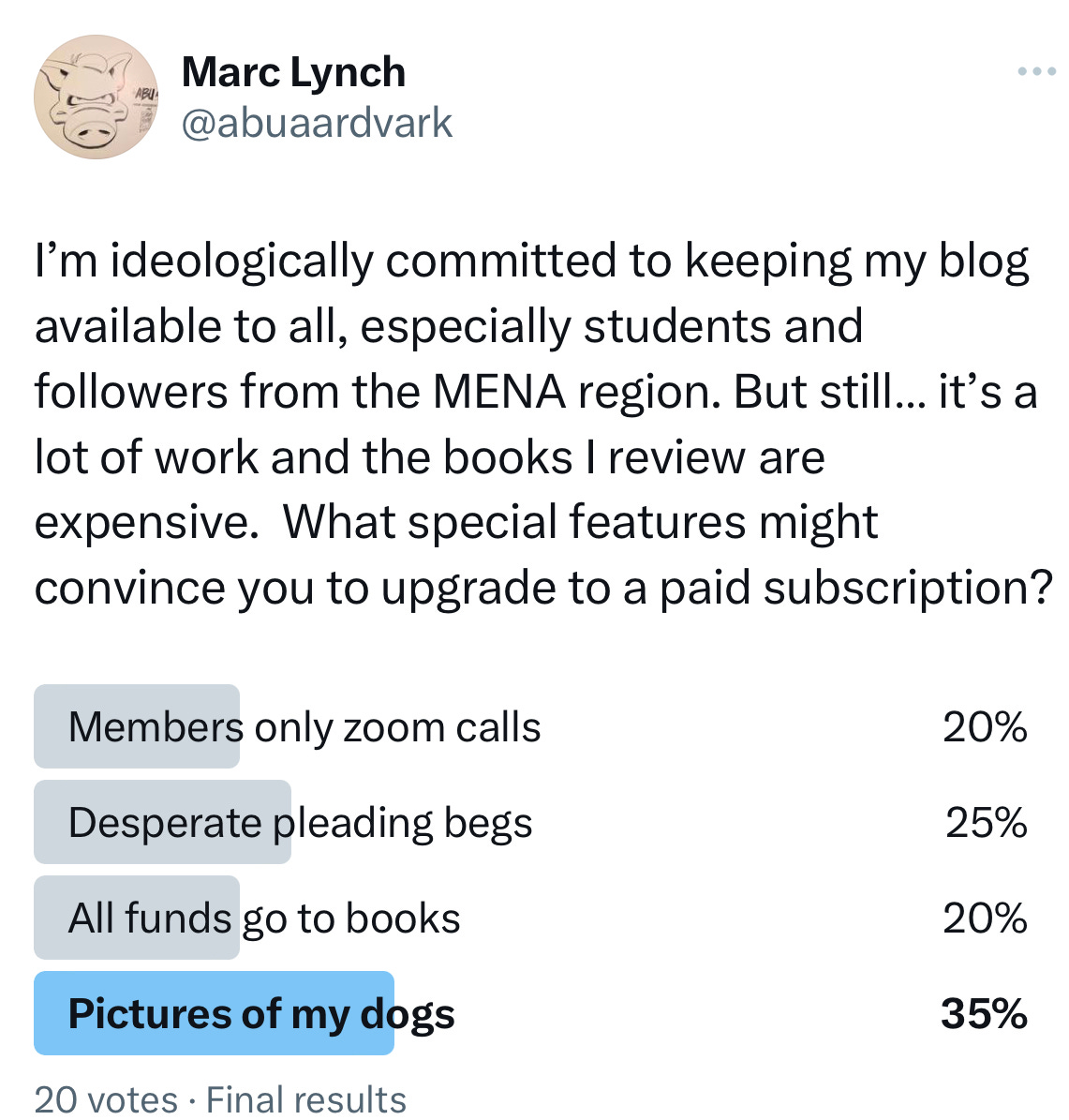Happy Birthday, Abu Aardvark's MENA Academy!
Reflecting on a year of blogging, and looking towards the future
It’s hard to believe that it’s been a full year this week since this blog launched (or, more accurately re-launched, building on the 2000s-era Abu Aardvark blog) with my review of Jillian Schwedler’s fabulous book Protesting Jordan.
Jordan, Forever on the Brink of.... What?
I wrote my dissertation and first book about Jordan, back in the 1990s, before there even was an Abu Aardvark, or blogs. The SEO optimized title State Interests and Public Spheres somehow didn’t make it a runaway bestseller, or tell readers anything about what the book was about. But the subtitle was a bit more on point:
I’ve been incredibly gratified with the response from the MENA politics community, broadly defined, with thousands of subscribers and thousands of readers on each post. It’s been a versatile platform, and a good way to maintain communication with my extended scholarly community as Twitter is steadily Muskified and rended unusable. It’s pretty time-consuming, but it feels like effort well spent. I’m so grateful to the core group of supporters who have subscribed without selective incentives; I probably wouldn’t have kept this going without their generosity and encouragement. I’m thinking now about how to attract a few more paid subscribers to underwrite my book purchases (especially). From this week’s twitter poll, it seems pretty obvious what the people want. But more on that in a moment. First, a look back.
I started this blog because I really missed the old-school blogosphere. There are so many great platforms out there, some that I helped create, but they each had distinctive styles and expectations that didn’t leave room for, say, book review essays or commentaries on an article. Twitter was great for sharing links and connecting with local MENA scholars and journalists, but even pre-Musk was utterly unusable as a platform for serious discussions. You don’t want to see me dancing on TikTok, trust me on that one. Substack and similar platforms felt like a way to get back that old time blog vibe - and the growing numbers of smart, interesting folks joining the wave suggests that there’s a real hunger out there for the model.
It does feel like old-school blogging to me now, I’m happy to say, and more sustainable since it isn’t expected to be a daily thing. In the year since I re-launched the blog, I’ve published 78 posts on a wide range of topics and formats, averaging about a post and a half a week (with some weeks off while traveling, grading, or bored). That’s included review essays on 38 books, which didn’t quite live up to my plan to review a new book on MENA politics every week, but came tolerably close. Sometimes I get busy, you know? But I plan to keep that up, because there’s just so many good books out there, I love writing these particular kinds of review essays, and it’s the only way I’ll actually force myself to read the books I acquire. I also have tried to synchronize the review essays with my podcast conversations, to really maximize the impact and synergies.
I’ve also written a good number of old-fashioned blog posts, the type of analytical takes on current events and on MENA political science themes for which I didn’t feel like I had a real outlet for anymore (even before the demise of the late, lamented Monkey Cage). I’ve done roundups of interesting journal articles, and posted spotlight interviews about my wonderful colleagues. I’ve increasingly tried to integrate the POMEPS Middle East Political Science Podcast into the blog. And I’ve used the platform to post the results of the Middle East Scholars Barometer surveys (including this really unique one focused on the professional concerns of MENA politics academia):
COVID's generational impact on MENA scholars
For the last two years, Shibley Telhami and I have been running the Middle East Scholars Barometer. Twice a year, we survey as broad a group as possible of academic experts on the Middle East, drawing on the membership of the Middle East Studies Association, American Political Science Association, American Historical Association, and the Project on Midd…
I love all the free subscribers - especially with Twitter melting down, it’s by far the best way to reach my community. And I love that a solid half of subscribers open and read each post, so I’m not going straight to everyone’s spam filter (yet). So why ask for more paid subscriptions?After all, the purpose of this blog is to share research, ideas and information with the broadly defined MENA politics community. I don’t want to put stuff behind a paywall which could exclude anyone — especially graduate students and scholars from the region. Nobody should ever feel any pressure to contribute. So, that said, it’s a lot of work, books aren’t all free, and it would be tremendously helpful. So I asked Twitter how can I encourage more paid subscriptions from those who can afford it and feel so inclined? I am intrigued by the Peter Beinart model of weekly webinars with interesting guests for paid members only, and that’s something to potentially plan out for the future. Anyway, the will of the people in my highly unrepresentative Twitter poll was clear. For now here’s a teaser of coming attractions for the paid members tier - say hi to Jack - who joined my life just before the Arab uprisings and is a very good boy!








Thank you Rohan!!
As a long-time reader of your work (dating back to Abu Aardvark!), and someone with a not-fully-academic interest in the region (since I live in it, though I work on South Asia), I just wanted to say thank you for creating such a useful resource, full of fascinating reviews, round-ups and interviews – which also acts as a useful model for those of us thinking through how to turn the spotlight on interesting scholarship emerging in our own fields. Congratulations on a year of MENA academy!